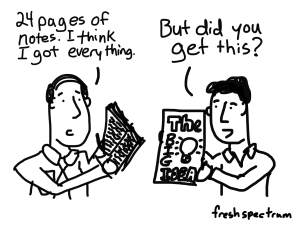
This is Part II of a 2-part post on enhancing student note-taking. Be sure to also read Enhancing Students’ Note-taking Skills I: Note-taking Methods. Students’ commitment to conscientious note taking will be strongest when they understand and actually experience the resulting benefits. Those advantages can be perceived on three levels: a) overall life skills, b) course-by-course survival skills, and c) winning tactics.
Life Skills
Research has shown that habits of methodical note-taking have many life-long benefits.
- Improved memory
- Increased understanding of everything a person reads or hears
- Elevated success not only on tests/exams, but also in later professional contexts
- Heightened attention when listening/reading (mentally-active viewpoint)
- Enhanced writing ability
- Boosted productivity
Note-Taking Survival Skills
These may be outlined according to the familiar Pre-While-Post model.
Prior to attending any class or lecture, encourage students to do the following
- Preview the reading and think of what will be discussed next
- List unfamiliar vocabulary/terms/concepts
- Read notes from previous classes
- When something is not clear, compose a specific question to ask their instructor or a success-oriented classmate
While in class, recommend that students
- Organize their notes by date, subject, title, etc.
- Arrive early and find a spot where they can hear and see clearly
- Leave space between notes to allow filling in anything that might be missed
- Ask themselves “why this information is important,” to avoid writing down irrelevant details
- Be brief in their note-taking, using abbreviations and symbols to save time when necessary
- Use different colours to highlight important points
- Observe the instructor’s verbal cues. (i.e., “there are two major issues…”); Also, pay attention to transitional words (i.e., first, next)
- Explain abstract ideas with the instructor’s examples, or note them in a way that makes them clear when studying later
- Make notes with a specific eye to their eventual use (e.g., remember that their notes are only valuable if they improve learning)
After class, guide students in making effective use of their notes, by
- Most obviously, remembering to store their notes neatly so as to have them accessible when reviewing and studying for tests, exams, and quizzes
- Reviewing and reflecting on their notes on a regular basis, even before any test is coming up
- Rewriting their notes as a way to recall the information better (this may require trying out different methods to find what works best for them)
- Comparing their notes with a success-oriented classmate to see what they missed, or to clarify confusing information
- Putting concepts together to see the “big picture” and thinking of a summary in their head
- Reciting the information using only key words
Winning Tactics for Effective Note-Taking
| Widely Applicable Tips for Making Notes with High Potential for Effective Use |
| Academic Listening | Academic Reading |
| Be an active listener (tune in) | Engage in active reading (focus/read with a purpose) |
| Sit near the front of the lecture room/class | Take your time to digest the information |
| Pick up on changes in pace/tone/volume (i.e., “This is important!) | Pause to think about what you read, and ask yourself relevant questions (critical thinking) |
| Watch for clues to overall organization | Write a summary of key/main points |
| Watch for material written down by the instructor (i.e., blackboard, handouts) | Try taking notes from memory |
| Watch for clues to overall organization | Write a summary of key/main points |
| Ask the instructor relevant questions | Write your notes in your own words |
| Make eye contact with the teacher | Avoid over highlighting the reading |
| Avoid external and internal distractions while listening or reading |
| Make your notes personal |
| Do not write everything down; write only what’s important, and keep your notes brief and focused) |
| Increase your academic vocabulary |
| Use abbreviations & symbols |
| Don’t worry about spelling/missing points |
| Complete the reading before class |
| Review your notes regularly |
In conclusion, all note-taking techniques benefit from being taught and scaffolded, which includes how students notes can actually be used once they have been made. What methods do you employ to teach your students not only how to take notes, but above all, how to use them effectively? Please feel free to share in the comments.

I want to express my gratitude to the author for sharing such valuable insights and strategies for improving note-taking skills among students. As someone who has struggled with effective note-taking in the past, I appreciate the practical and actionable nature of the advice given in this post.
Overall, I believe that this blog post is a valuable resource for students who want to improve their note-taking skills and achieve greater academic success. Thank you to the author for sharing their knowledge and expertise on this important topic, and for providing practical tips that are sure to make a difference in students’ academic lives.
Hello Harshu,
Thank you very much for your input!
This term, I am teaching College Communications at Niagara College (COMM1020) and I shared my blogpost with them:)